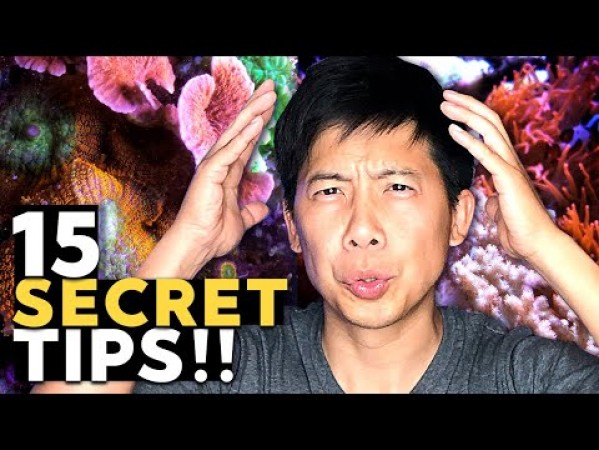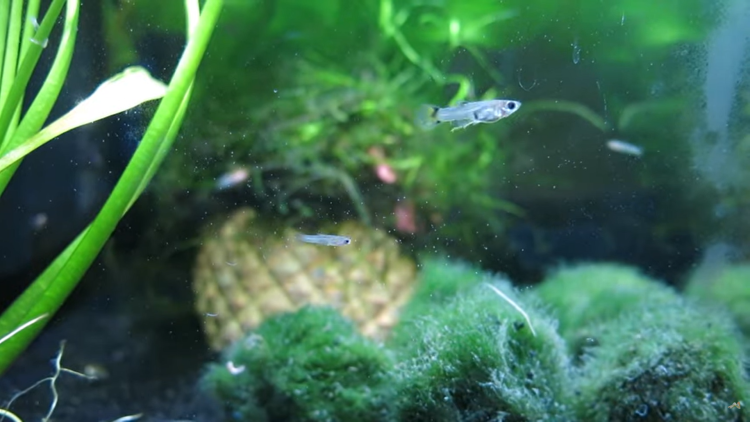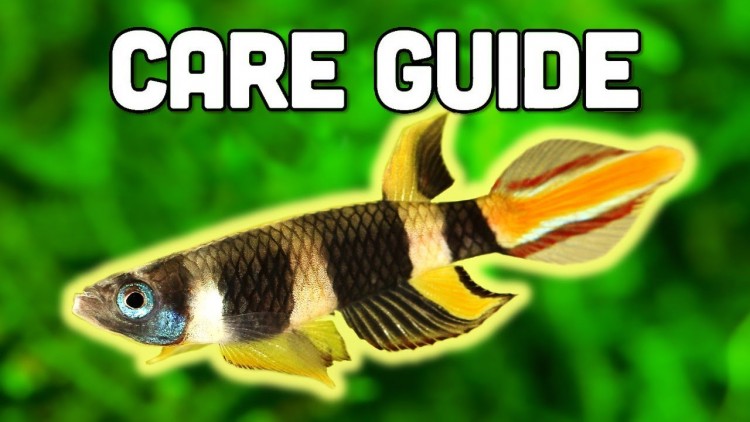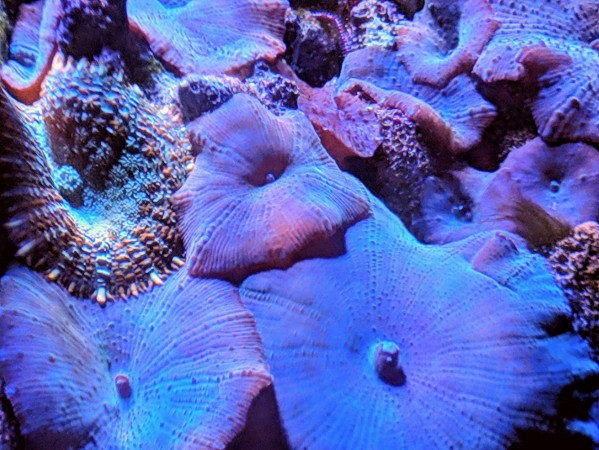15 Awesome Reef Tips from YouTubers
- Aug 30, 2019
- Web Aggrigator
- 3506 0 0

Inappropriate Reefer touch bases with some of the top influential individuals on YouTube to get from them a quick tip on Aquarium Reefs, and this is what they had to say.
Do as much research as you can before entering the hobby. Buy the largest tank you can afford to make stability easier to accomplish. Test your water weekly and learn how to adjust the parameters to make sure everything is safe for your fish and corals, and buy frags versus buy coral colonies. Frags are easier to inspect for an undesirable pest.
Those where all common suggestions, somethings else you may want to consider is finding a mentor in the hobby. Someone you can talk to on a regular base and discuss what you are doing, finding someone who has been in the hobby for some time. They will most likely have gone through all of the mistakes that you are likely to make and can help guide you away from making the same mistakes. If you already made a mistake, they could help you get back on track quicker.
Having someone in the hobby that genuinely enjoys and loves the hobby as much as you do can make your experience much better.
Aqua Splendor goes over his tips for taking beautiful pictures of your Reef Aquarium.
- Clean the Glass - Clean the Glass before you start taking pictures. I use many different types of tools to get all of the algae off of the glass and the corners.
- Dealing with Blue Light - Sure you can edit the picture after you take the photo, but it takes time to do that. When taking your pictures, you can use a filter that will automatically filter out the blues. There are options for DSLR camera, and there are even your smartphone clip-on filters.
- Your Surroundings - When taking pictures of filing your aquarium always be aware of your surroundings. If possible, turn the lights off in the room so that the primary light source is the aquarium, which will make it the focal point and will enhance your shots.
Jake always harps on stability in your aquarium, but today he wants to focus on aquarium food.
Jake hardly feeds frozen foods to his tanks, its more of a treat, for breeding or when acclimating new species to his aquarium to get them to eat. You do not want to eat frozen meals every day if you did, it would lead to an unhealthy lifestyle. Your fish are no different. The primary food source for his tanks are flakes and high-quality pellets. Just about everyone overfeeds their aquarium. By reducing and controlling the amount of food in the tank can reduce your overall maintenance of media replacement such as GFO or cleaning your protein skimmer and dealing with algae issues.
The main tip I want to get across to everyone is to reduce the amount of frozen food used in their tank. If you have fish that are not attracted to flakes or pellet food, stick with it. Eventually, they will get hungry enough that they will start to eat them just like your other fish.
Jeff from Mad Hatter's Reef, focuses on maintenance, especially detritus build-ups. Jeff uses an inline pump like the Cobolt Aquatics Inline Pump and some silicon tubing. He uses it to remove as much detritus as he can from his reef tank and sump. The silicone tube that is displacing the water is attached to a filter sock in his sump. Allowing the filter sock to catch the detritus. Doing it this way, you do not have to worry about replacing water how all of the water remains in your system. By having this be part of your monthly routine, you will start to notice an improvement in your water quality.
Focusing on Zoas how they are the most common corals kept, especially by a new hobbyist.
- Zoas will not open - One of the common issues with zoas is them not opening up. Even on a well-established tank, you may buy a new zoa, and it could take months to open. Each coral will take its own amount of time to acclimate to a new environment, be patient. If you start dipping the coral and moving it around you will only irritate it more. Keep your phosphates below 0.09, more times than not, this one of the issues that will cause zoas to stay closed.
- Feeding - I love feeding Reef Roids to my zoas, I feel like it has enhanced the colors of my zoas and has worked well for me. If you do not have access to Reef Roids, there are many other types of food that you can use, but direct feeding does help zoas grow quicker and enhanced their colors.
- Alkalinity - keep your parameters stable and keep a close eye on your Alkalinity in your tank.
Stop chasing numbers and try to match other people parameters in your tank. Your Alkalinity can be 7 or 11 it does not matter, pick a number that is maintainable for you and stick to it. As long as the value of the parameteris within the allowed range of a reef tank pick a number and stick with it. Your nutrient level can be higher or lower, and either one is fine just as long as your remain consistent corals do not like swings in parameters. Stability is the main key to reef keeping.
Do not feel like the equipment you have or want is what will make this hobby successful. In the end, it is in the hand of the controller, which makes this hobby successful. I have seen some super successful tanks have no high tech equipment and just follow basic husbandry to maintain their tanks.
To achieve long term success in this hobby, you need to quarantine everything that goes into your display tank. That means quarantining fish, coral, and also invertebrates.
- Having a proper quarantine system setup will go a long way to preventing pest from getting into your main display and potentially killing your fish or corals.
- Setup a proper maintenance schedule and stick with it. Most reefers tend to forget or neglect their return pumps and skimmer until it is not working properly or breaks.
- Never stop learning, in my free time, I like to go through and learn more about what other people are doing. The more you know, the more you grow.
- Enjoy the ride, sometimes we get so caught up the future equipment that we want or the next build, and we forget to enjoy what we have and celebrate the progress that you have made so far.
Working with vinal tubing can be difficult to get it to go where you want it to go. Here is a tip to make it easier to work with. I like to place the tubbing in my dryer for 10 min on high. Please note, that if you leave the tubbing in the dryer too long, it could melt and ruin your dryer or worse yet cause a fire so if you try this do not set the timer more then 10 min. You will most likely have to put the hose in the dryer for more than one 10 min duration. For my particular dryer, it takes about 25 min to make the tubing completely limp and easy to work with. Once the tubbing is soft enough to work with you, want to work quickly as the tubbing cools it will try to go back to its original state. Doing this make it much easier to get it into a hose barb without fighting it as much. I hope this tip/trick was helpful, enjoy.
Be proactive in your tank. What I mean by this is that you should keep up with your water parameters and maintenance and not wait for something to happen in your tank to cause you to do something. Do not wait for your corals to become discolored, algae build-up, or your ATO to start beeping because it is out of water. Don't wait to test your aquarium water regularly and establish a schedule that keeps everything in good condition. Corals drive on stability, so if you wait for a problem to do something, then you are not maintaining a stable environment for them. So be proactive with your aquarium, and you will see success in the hobby.
You do not have to have the most advanced equipment to be successful. Some of that equipment may reduce some of the tasks you perform but do not guarantee success. Success comes from being proactive. You do not have to spend a lot of money on your tank to be successful in the hobby.
The industry is super seasonal, take advantage of it. The winter months are more active for the hobby. In February I will see twice as much traffic as of July. Around Springtime the hobby drops drastically. If you are thrifty shopper, then take advantage of the Springtime because most retailers will try to unload as much as possible to accommodate for the slow times to come.
Maintenance tip to keep your aquarium looking clean. I use a turkey baster to blow all of the rocks, and I use the tip of the baster to stir up the sand bed. While doing this, you want to keep your flow on. This allows the debris to get sucked into your filtration. If you have not done this for a period of time and have a sand bed, you want to start off by stirring up small sections of your sand bed at a time because it can release harmful stuff into your tank. When you stir up your tank, it will get cloud, but it normally takes about an hour for my tank to clear back up.
When you want to dose a large amount of something in your tank, and you do not want to sit there and slowly pour it into your tank, get a solo cup. Set the solo cup in an area that is safe, and that will not fall into your tank. Poke a small hole on the bottom of the solo cup and pour what you want to dose into the solo cup, the small hole will allow for a small amount to release into the tank at a time. Instead of standing over the tank for several min, I can just pour it in the cup and walk away. Make sure to keep the lip of the cup over the tank because as the cup runs dry, the stream will become smaller and could start to trickle under the cup and make a mess. Also, keep in mind that the size of the hole will dictate how quickly it will go into your tank.
By the right equipment, by buying the right equipment, it allows you to buy something once. The most expensive equipment is not nearly the right equipment in most cases, every tank need is different, and the results will vary. So when you go to buy equipment research and study to find out how your species needs and determine what will help you achieve this in your setup.
On the flip side, cheap equipment is normally cheap because they miss out on a lot of the essentials. You may feel like you are saving money, but if you have to buy the same piece of equipment multiple time, in the end, it is causing you to spend more money,
So buy the right equipment and enjoy reef keeping.
Patients, caretaker, or equipment impacts to a reef tank may have immediate consequences, but the tank will turn slowly to find its balance. This is especially true on a new tank which needs to go through their ugly phase before they can thrive. This is the same for an established tank after an equipment failure. For all you new people in the hobby I suggest you wait it out, do not rely on magic elixir out there that claim to speed up the process be patient, there is tons of information out there regarding new tank syndrome and how to properly cycle a tank. Learn all that you can while being patient, there are a few quality products out that that can accelerate the process, but ultimately you have to wait for the tank to find its balance.
In regards to equipment weather you buy cheap stuff or top of the line stuff, it will all break. Hopefully, it's not something tragic like a heater getting stuck on the ON possition but regardless correct the problem and be patient the tank will find its balance again. Do not get frustrated, keep learning, and do not give up. You just need to be patient.







About author
The content found on this page was found and added by Tank Facts to make it easier to learn about new species and keeping all of the found content in one place. The brand and content is owned by the respected individuals and in no way considered Tank Fact